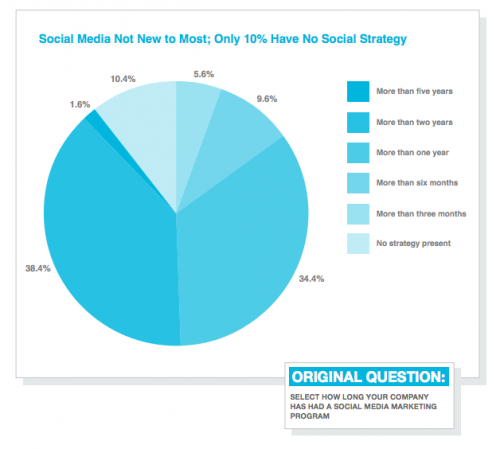We Are Social Asia Tuesday TuneUp #33
YouTube launches in Indonesia
YouTube launched a localised site for Indonesia last week at YouTube.co.id, which is available in the local Bahasa Indonesia language. To enrich the localised site, YouTube has also partnered with some of Indonesia’s top media companies such as Kompas TV, Kompas Cybermedia, Viva Media Group and MyTrans.com. Local musicians will also be able to monetize their content with YouTube Indonesia through advertisement revenue share.
Sina Weibo integration in Microsoft 8
Following the announcement by Apple that its iOS6 and desktop OS Mountain Lion update includes some integration with Chinese microblogging service Sina Weibo, Microsoft has also announced Sina Weibo integration in Windows 8. Sina Weibo will be integrated into the Windows 8 People app, the completely cloud-powered address book for Windows 8. Its users will be able to sync their microblogging contacts to Windows 8, as well as post a weibo from within the People app itself and elsewhere in the desktop and tablet OS, such as in SkyDrive. It is highly likely that Sina Weibo will become integral to WP8, the next version of Microsoft’s mobile OS.
Sina Weibo’s 6 degrees of separation
Sina Weibo has a new experimental feature called ‘6 Degrees of Separation‘, which references the idea that everyone is approximately six connections away from another by way of introduction. It basically shows the chain of connections one has to any other user of the microblogging service. As Steven Millward from Tech In Asia pointed out, this could be a useful and easy way of finding connections between people who use Sina Weibo, especially when trying to make a business connection. After all, guanxi – interpersonal relationships – is vital in China. Previously, social network Friendster did display the connections between two users based on their list of common friends, as does LinkedIn, although both did not go so far down the chain of relationships.
Facebook’s ‘Poke’ doesn’t work in China
Joe Chen, CEO of Chinese social networking site Renren, provided some interesting insights into the unique Chinese social networking space and users’ behaviour. For instance, Chen revealed that the ‘poke’, an action that was once-popular on Facebook a few years ago, has never worked in China. Instead, users preferred to take a jab at their friends by stealing each other’s virtual vegetables. This reflects how prevalent social gaming is in China. Chen also acknowledges the potential of Pinterest, and while there are many Pinterest ‘clones’ in China, Renren is looking to leverage the Pinterest concept to drive more links and greater activity, as e-commerce is one of its key drivers, in addition to gaming and brand advertisements.
Social media spending in Asia-Pacific to rise
Buddy Media’s ‘The State of Social Media Marketing in Asia-Pacific‘ looks at social media usage and spending within the region. The whitepaper reveals that Facebook, Twitter and YouTube are the most widely used social networks by companies in the region, which is hardly surprising, but something of note is that Pinterest is seeing greater usage than Google+, with 20.8% of marketers surveyed utilising Pinterest as compared to 12.8% using Google+. Social media is definitely not new to most brands and agencies around the region, as 75% of respondents have had social marketing programs in place for more than a year, and almost 40% of companies have been active in social media for more than two years. The more pertinent problem is not that companies are not using social media, but rather, they’re not using social media well. Even as 43% of brands and agencies anticipate spending 5% to 15% of their advertising budgets on social media in 2 years, which is a significant increase from the 23.2% who currently do, companies should work at optimising their use of social media in engaging their audiences.
80% of internet users are on social media
Russia has put itself on the map by breaking into the top 5 social networking countries. Russia has posted an impressive double-digit gain and now boasts 82% of its internet users on social, up from 52% in 2010.
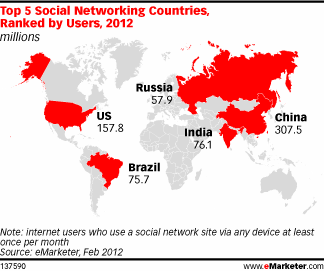
For retailers, social media is just as important as online shopping
American retailers have rated social media just behind online shopping as the digital channel making their businesses succeed. In terms of how they intend to use social media, 57% say “external brand promotion” with 51% intending to use it for customer insight. Only 45% intend to use it for two-way customer engagement. Baby steps…
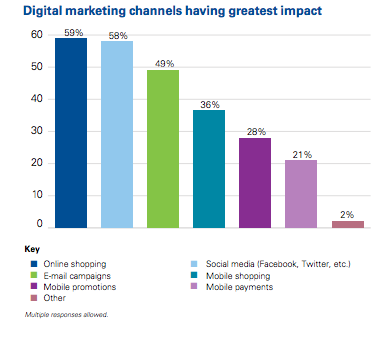
Has brands’ lust for the ‘Like’ diluted social marketing?
A new report from comScore, in collaboration with Facebook, says that brands focus too much on the number of Facebook Likes as a sign of success, instead of working to reach their target audience, engage with them and then getting their fans to amplify that message. The report touts the achievements of social media darling Starbucks, which found that earned media exposure did lead to increased sales.
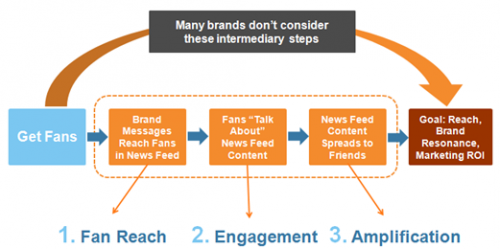
Facebook user growth is slowing, but time spent there is not
Because there’s a limited number of people in the world, this news was bound to appear soon: Facebook isn’t posting the huge user gains that it has in past years. comScore has just reported the lowest growth in US Facebook users since it started recording the data in 2008. But what is still growing is the amount of time spent on the site, which is up at six hours a month, still more than the time spent on Google or Yahoo sites.
Apple gets friendly with Facebook in iOS 6, kills Ping
When Apple releases its iOS update this autumn, we’ll see a healthy helping of Facebook sprinkled in. Facebook features will now be baked into the OS and will be available to apps via an API, with full integration for calendar events, birthdays, as well as contact emails and phone numbers inside your Calendar and Contacts apps that always stay updated. The social network also ties in with Siri for sharing status updates, as well as with your Mac within OS X’s “Mail, Contacts, and Calendars” screen for syncing with iCal and your Address Book. Lastly, Facebook “Likes” have also been fully integrated into the App Store and iTunes.
Apple has also finally pulled the plug on Ping, its social network for music, which never took off after it was unveiled in 2010. Instead, Apple will defer to the social networks that do work such as Facebook and Twitter and further cement their relationship.
Facebook’s new ad exchange, testing social ads off site
Facebook is testing a real-time bidding ad system where visitors to third-party websites are marked with a cookie, and can then be shown real-time bid ads related to their web browsing when they return to Facebook. The system, called Facebook Exchange, could show an ad for a travel site to someone who almost bought a flight on the site earlier that day.
Buzzfeed is testing new ad integrations with Facebook, allowing Buzzfeed to use the Like or Share buttons in ads on its site. It’s not yet clear how widespread ads with Facebook plugins will be, but Facebook is said to be rolling out trials with other sites shortly.
Facebook releases WordPress plugin
WordPress has also just gotten a nice new plugin from Facebook, which makes it easier to cross-post content to Facebook and take advantage of native Facebook features like mentions, as well as providing a range of Facebook social plugins as widgets within WordPress.
Twitter reveals expanded tweets and tailored trends
Expanded tweets just got a bit bigger when Twitter announced earlier this week that tweets from partner sites, such as The New York Times and The Wall Street Journal, now show content previews, Twitter handles for writers, and video and image galleries. To be honest, these features have been available in Chinese microblogging service Sina Weibo for quite some time already, which we have discussed previously here when Twitter first announced its re-design in December 2011.
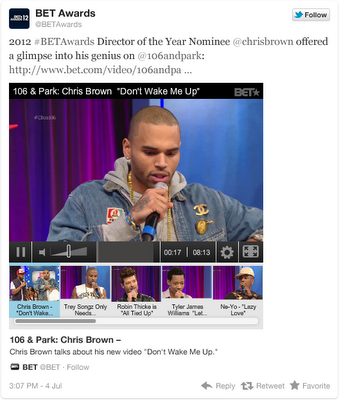
Twitter has also switched up its “trending” algorithm, which now shows users hot topics based on who they follow.
Google+ pages can now be linked to websites
Google is continuing its quest for search to go social by linking a company’s Google+ page to its website. By doing this, brands’ content could appear next to search results, as Google’s Dennis Troper says:
When you link your website to your Google+ page, your recent posts can appear in lots of relevant places across Google. For example: when users search for your brand, an excerpt from a recent Google+ post may appear to the right of search results.
Major games developers desert Google+
Despite Google+’s increasing attempts to prove its relevance, two big social game developers are pulling their content from the network. Wooga, one of the gaming partners, said it would remove its games by 1 July though it didn’t give much indication why, but PopCap said it would rather allocate its resources elsewhere.
Foursquare displays lists, tips and more on Facebook
Bundled into Foursquare’s last update is the ability to turn on sharing for lists, tips, location saves and likes on Facebook – basically Foursquare integrates much more into Facebook than it did before. This could open the floodgate to oversharing, but fortunately this feature is as easy to turn off as it is to turn on.

Pinterest growth slows, but will drive majority of e-commerce referrals
Unique visitors to Pinterest in the U.S. grew from 18.7 million in March to 20.2 million in April, an 8% increase, but down from the period of hyper-growth between January and February when unique visitors climbed 72%, according to ComScore. Meanwhile, growth of unique visitors outside the U.S. is still in double-digits (21% between March and April), but Pinterest’s non-English speaking audience remains small.
Nearly 80% of its audience of almost 30 million is in the U.S., the U.K., and Canada, according to ComScore. The No. 4 and 5 markets are France and Brazil, which respectively had just 540,000 unique visitors and 301,000 in March.
However Pinterest is on pace to drive more social traffic to e-commerce sites than Facebook or Twitter by the end of the year. Pinterest is quickly eating into Facebook’s share of referrals, and it’s easy to forget that back in the first quarter of 2011, Pinterest made up just 1% of retailers’ traffic. Although Facebook still tops it at 60%, Pinterest now makes up 26% of the traffic and is only set to increase at the expense of the other, more mature networks.
Disqus unveils updated commenting system
The latest version of Disqus has a lovely, clutter-free interface that makes it easier to see how comments and conversations flow. They’ve also introduced great social features, making it easier to share and tag others in the comments, and comments are also now pulled in from Twitter.
Habbo suffers major crisis as it’s hit with pornographic chat scandal
When Rachel Seifert, a writer for Channel 4 News, posed as an 11 year old on Habbo, the massive virtual world for teens, she was soon trying to fend off creepy, unsolicited affronts from other users for cyber sex, which she says left her “feeling slightly dirty and then pretty quickly, outraged.” After Rachel’s story was published, the fallout has spread quickly. Balderton Capital has decided to dump its 13.5% stake in Sulake, the Finnish company behind Habbo and British private equity group 3i has also announced it’s selling its 16% stake and retailers such as Tesco and WH Smith have stopped selling gift cards that can be used as virtual currency on the site. The chat function has now been suspended.
Richard Branson takes on The Crimson Bandit on YouTube
At first, it seemed like an innocuous, typical jetsetter’s tweet from the Virgin mogul upon losing his diary, “I’ve been travelling a lot recently so I can’t be sure exactly where I left it, and I know it’s a long shot, but if anyone happens to find it I’d be very grateful if they could let me know!” But that tweet has now launched a series of videos where Richard Branson fights back against The Crimson Bandit, who claims to have his diary, to get Facebook fans to solve clues and riddles to get it back. And now The Crimson Bandit has been unmasked, but you’ll have to check for that spoiler elsewhere.
TalkSPORT launches Facebook social radio player
Perfect for listening to the Euro tournament live, TalkSPORT has launched a Facebook social radio player which seamlessly shares audio content on the listener’s wall.
Doritos survives Ross Noble’s Twitter bombard
Doritos had all hands on deck when comedian Ross Noble unleashed his Twitter followers upon the poor crisps company by asking them to tweet ridiculous questions. But Doritos had the last laugh when it sent back a bunch of hilarious photoshopped gems, including a hamster on a Dorito.

Sweden’s Twitter experiment starts to fall apart
If you’re following Sweden’s official Twitter account, you might have watched it crash and burn in a matter of hours, after last week’s Swede at the helm started tweeting about dead reindeers, a photoshopped “hungry gay with aids” and Jews. And that then turned into a conversation about Nazis. Perhaps not shockingly, Sonya the Swedish Twitterer has a blog where Hitler seems to be a common theme. @Sweden’s experiment is likely to put off any potential tourism boards from following suit, but they’ve definitely staked a new claim to being an edgy brand.

